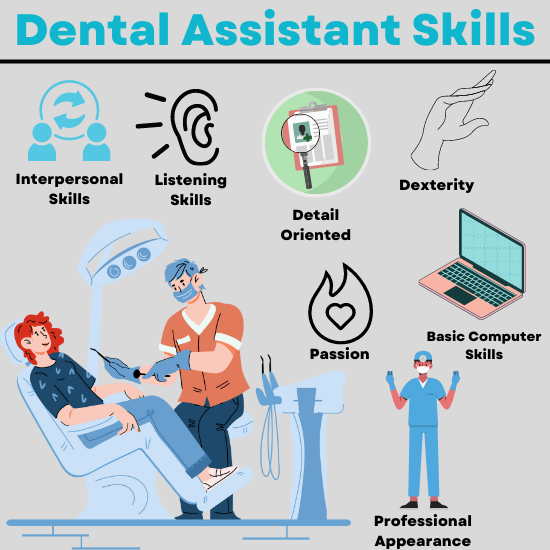What Makes A Good Dental Assistant
By: Celeste Yeik, RDH | March 2023
Dental assistants play an integral part in providing patient care and delivering an exceptional experience. From setting up procedures to following up with patients after treatment. Dental assistants are often referred to as the mind readers of the office, they are helpful and observant of the patient and team needs.
A great assistant will demonstrate key skills in implementing a smooth-running office. Key examples of these skills include; excellent organizational skills, a detail-oriented personality, ability to manage multiple things at once, above-average dexterity skills, professional demeanor, strong communication and listening skills, and a compassionate attitude. There are numerous reasons why dental assistants play an important role in the office below are 8 skills that dental assistants can bring to an office to stand out.

- Interpersonal Skills: This skill helps dental assistants properly interact with patients. Dental assistants work knee to knee with dentists and patients. In most cases, the dental assistant is the first point of contact with the patient. At times the patients may be in extreme pain and/or mental stress, so the dental assistant should be sensitive to their emotions. The dental assistant must have good conflict resolution and mediation skills this can come in handy when patients are in extreme pain or mental stress.
- Listening Skills: Dental assistants should be able to listen to patients and other team members. They need to demonstrate good critical thinking skills to follow directions from a dentist or dental hygienist. This skill helps so they can help treat patients and do tasks required to meet the patients’/team members' needs. To be an effective listener the dental assistant must maintain eye contact and face the patient. The dental assistant should never have their back to the patient when discussing the patient's needs or concerns. An effective listener must keep an open mind without passing judgment on the dentist or patient while speaking. Lastly, an effective listener gives regular feedback to support and better understand what the dentist or patient is needing.
- Detail Oriented: Dental assistants must follow specific rules and protocols established by the office, such as infection control procedures when helping dentists treat patients. Assistants also must be aware of their scope of practice as established by their state's licensing board. A dental assistant that is detail-oriented has an eagerness to seek out continued education to stay up to date on any topics discussed and have a clear understanding of why procedures are recommended. They have a take-charge attitude to anticipate any possible issues and handling of daily tasks. Lastly, a detail-oriented dental assistant is patient and is determined to explore a conflict or issue fully to assist in resolving it smoothly.
- Dexterity: Dental assistants must be good at working with their hands. They work in tight quarters on a small part of the body, while using very precise tools and instruments. A dental assistant with good dexterity has more control of the small muscles of the hand and fingers. Dental assistants should implement good working ergonomics including daily stretching.
- Professional Appearance: The dental assistant at times is the first point of contact when the patient arrives for their appointment, because of this, their demeanor sets the tone for the appointment. They should arrive to work in clean scrubs and have impeccable hygiene.
- Organizational Skills: Dental assistants should have excellent organizational skills. Organizational skills include physical, mental, and time management. Physical organization includes keeping the dental workspace organized and uncluttered. Mental organization involves keeping the dental assistant’s mind organized or being a multi-tasker. Time management skills can come in handy throughout the day as patients come in and out of the dental office. Keeping patients and examination stations clean and ready for the next patient will help the dentist move from patient to patient smoothly throughout the day.
- Basic Computer Knowledge: Knowledge of dental software and basic computer skills are needed to perform a dental assistant task. Being proficient in these programs with help the dental assistant with chart notation, treatment planning, insurance claims, etc.
- Passion: The dental assisting profession requires the assistant to wear many hats. It requires a passion for helping and a genuine desire to care about your patients.
Interpersonal skills begin with good communication skills including verbal communication, non-verbal communication, and listening skills. A dental assistant with good interpersonal skills is also a great team player. Lastly, a dental assistant with good interpersonal skills can solve problems and make decisions to then communicate the patient’s needs to the doctor.
Anyone exploring a career in dental assisting should evaluate the importance of what the career expectations are and be ready to fully embark on a mentally and emotionally fulfilling career. Dental assistants are in high demand throughout the industry, mainly because an office can not function without this crucial role. If a career as a dental assistant seems like a good fit for you, then you can start your dental assistant training today with U.S. Career Institute.
